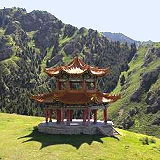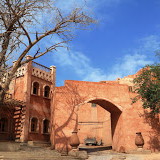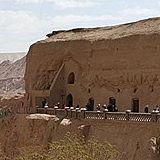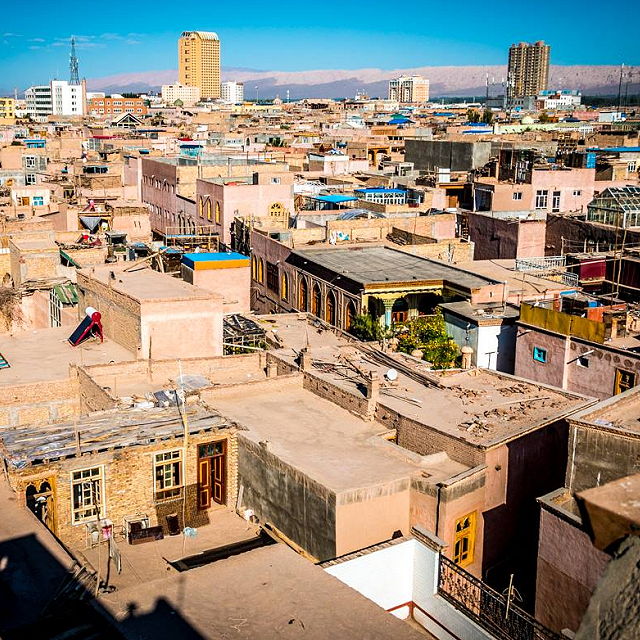Choose the Country:

|
Xinjiang China Last Updated: 10/05/2023 |
| Xinjiang, officially known as the Xinjiang Uyghur Autonomous Region, is a vast and diverse region located in the far western part of China. It is the largest province-level administrative division in China and occupies a significant portion of Central Asia. Xinjiang is known for its rich cultural diversity, stunning natural landscapes, and historical significance. Its population was 25,890,000 in 2021. | |
| - Geography: Xinjiang's geography is incredibly diverse, ranging from arid deserts to lush mountain ranges. It is home to the Taklamakan Desert, one of the world's largest sand deserts, as well as the Tian Shan and Pamir mountain ranges. - Cultural Diversity: Xinjiang is home to a diverse population of ethnic groups, with the Uyghurs being the largest ethnic group. Other significant communities include the Kazakhs, Hui Muslims, Kyrgyz, Tajiks, and Han Chinese. This cultural diversity has influenced the region's cuisine, language, and traditions. - Languages: Uyghur is the dominant language spoken in Xinjiang, and it is written in an Arabic script. Mandarin Chinese is also widely used, especially in urban areas and for official purposes. - Cuisine: Xinjiang is known for its unique cuisine, which includes dishes like lamb kebabs, hand-pulled noodles (laghman), pilaf, and flatbreads. The food is often seasoned with a variety of spices and reflects a blend of Central Asian and Chinese influences. - Silk Road History: Xinjiang played a pivotal role in the ancient Silk Road trade routes, serving as a crossroads for cultures, religions, and goods between East and West. Numerous historical sites and artifacts along the Silk Road can be found in the region. - Tourist Attractions: Xinjiang offers a range of tourist attractions, including the ancient city of Kashgar, the stunning landscapes of Tian Chi (Heavenly Lake), the Gobi Desert, the Flaming Mountains, and the Karakoram Highway, which connects China to Pakistan. - Natural Wonders: The region boasts breathtaking natural wonders such as the Karakul Lake, the Altai Mountains, and the vast Gobi Desert. These landscapes provide opportunities for outdoor activities like trekking, hiking, and camel rides. - Challenges: Xinjiang has faced challenges related to ethnic tensions, human rights concerns, and security issues. It's important for visitors to be aware of the local political and social context and to adhere to local regulations. - Transportation: Xinjiang is well-connected by air, with major airports in cities like Urumqi and Kashgar. The region is also accessible by train and road, including the Karakoram Highway. - Safety and Travel Advisories: Before traveling to Xinjiang, it's advisable to check for any travel advisories and guidelines issued by relevant authorities due to the region's unique geopolitical situation. Xinjiang's cultural diversity, historical significance, and stunning landscapes make it a fascinating destination for travelers interested in exploring the Silk Road heritage, experiencing unique cultures, and enjoying the natural beauty of this remote part of China. | |
Wikipedia
China » Xinjiang
Place » City

|
Kashgar Old City Place » Historical Place Kashgar, also spelled as Kashi or Kasgar, is a historically and culturally significant city located in the Xinjiang Uyghur Autonomous Region of China. It is one of the westernmost cities in China and has a rich history and unique cultural heritage. It is one of the oldest continuously inhabited cities in the world and has a population of 711,300 people (as of 2019). 126 views 💖 1China, Xinjiang, Kashgar, Kaxgar, Yawage Rd |

|
Bezeklik Thousand Buddha Caves Place » Historical Place The Bezeklik Thousand Buddha Caves, also known as the Bizaklik Thousand Buddha Caves, is a historically and culturally significant site located in the Gaochang District of Turpan (Tu Lu Fan Shi), Xinjiang, China. These caves are renowned for their Buddhist art and murals, which date back over a thousand years. 123 views 💖 1Gaochang District, Tu Lu Fan Shi, Xinjiang, China, 838015 |
